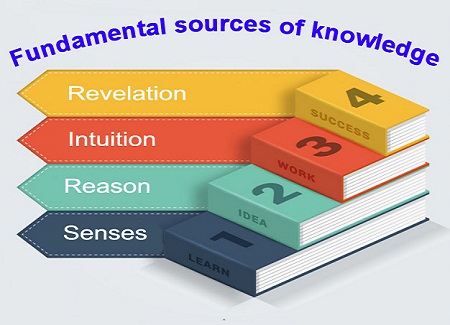
There are four fundamental sources of knowledge. These are ( 1 ) Senses ( 2 ) Reason ( 3 ) Intuition and (4 ) Revelation. A brief commentary on these sources of knowledge is as under:
1. Senses: First door of knowledge
Trees look green, sugar tastes sweet and rose gives fragrance. All these information are collected through our sensational system. We have five senses 1. sight 2. hearing 3. smell 4. taste and 5. touch. These senses acquire knowledge from the outer world and pass to our mind where these information are stored and saved for long time. As senses provide us firsthand information about outer world and these information channelize other sources of knowledge so they are considered first door of knowledge. Senses work in materialistic world only. Knowledge acquired through senses is more reliable as compared to other sources of knowledge because of its measurable proofs and computational evidences. All the scientific knowledge falls within the domain of knowledge through senses.
2. Reason: Seat of Rationality
Have you ever touched hot fry-pan? How that experience was? Would you like to touch it again? Surely your answer will be a big “No”. Let me explain this “No”. When you touch hot fry-pan very first time your sense of touch tells you that it is a bad experience. Your conscious mind involves in this bad experience and guides you never to touch it again. In this experiment, sense of touch passes information to conscious mind. Conscious mind interprets all these information as bad experience and guides you never to do again. So you have a reason behind this decision. There are two methods of reasoning.
A. Induction
In this method we move from specific to general. For example, if sparrow is a bird and can fly then all the birds can fly.
B. Deduction
In this method we move from general to specific. For example, if all birds fly then sparrow can fly because sparrow is a bird.
Knowledge acquired through reason is less reliable as compared to scientific knowledge as it lacks in solid evidences and computational proofs. However its range is higher than scientific knowledge as it works in both materialistic as well as immaterialistic world. Philosophy falls within the domain of knowledge acquired through reasoning.
3. Intuition: Eye of wisdom
If you are facing a situation where your reasoning is going failed to guide you, you should by-pass your reasoning. In this case your conscious mind cannot guide you. So you should go deeper into your sub conscious mind. Suddenly you will find the solution. Believe me it will be a good solution for the problem you are facing. Knowledge acquired without the involvement of conscious mind is called intuitive knowledge. Intuition is higher than reasoning and sensation. Only genius people can use intuition to acquire knowledge. Actually eyes of heart are involved in Intuition. So you need to open the eyes of your heart to knock at the door of intuition. You can use imagination techniques to acquire knowledge through intuition.
4. Revelation: Highest source of knowledge
When senses, reason and Intuition fail to give us the solutions of all problems we human beings are facing on this planet, we need super knowledge to make our life successful. Here divine power directly involves to guide us. Revealed knowledge is the highest form of knowledge.













